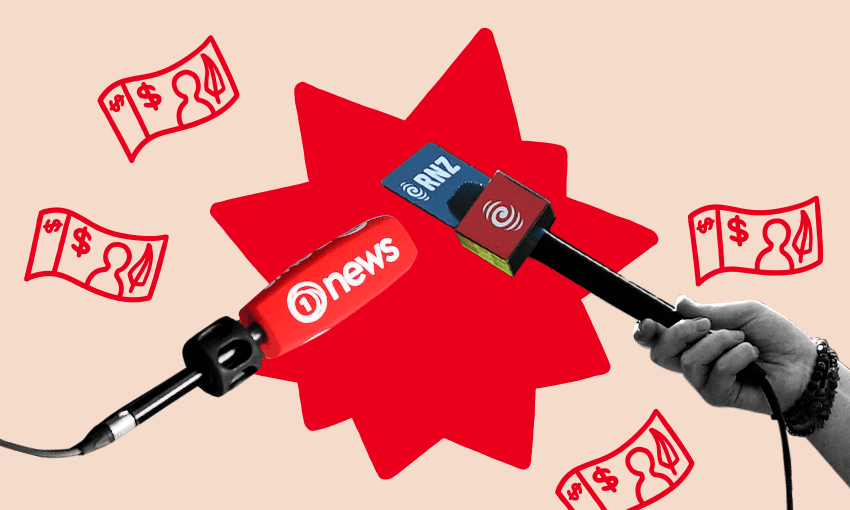Recent scaremongering over the effects of the TVNZ-RNZ merger on commercial media is half-baked and overblown, argues Better Public Media chair Myles Thomas.
The Aotearoa New Zealand Public Media Bill legislative process is hotting up with a few big developments going public in the last few days, presenting three new angles on the merger between TVNZ and RNZ.
Firstly, broadcasting and media minister Willie Jackson said TVNZ needs to change its approach to public media. He’s absolutely right. TVNZ is commercial, so its primary focus is serving audiences to its advertisers. That’s the opposite of public media, which is simply to serve audiences. The government has not spent four years researching and planning a new public entity for it to just be trashy old TVNZ all over again. And it’s excellent news that at least the minister is clear about that.
The second point to note was the commercial media submissions to the select committee. They showed large-scale fearmongering about dangers from the new entity that frankly are exaggerated. The commercial behemoth that is TVNZ has always severely hampered TV3/Mediaworks/Discovery’s success by being an aggressively dominant commercial television network. This is what the government of the day allowed them to do. If the new entity was to take that same highly-commercial approach with its news website, or with the radio station currently known as RNZ, then Stuff, NZME and all the existing news websites and newspapers would be facing a staunch new competitor. But the government is actually proposing something quite different – making TVNZ less commercial by giving it far better funding and requiring it to be non-profit.
So the government is at last reining in TVNZ’s commercial dominance. You’d think the commercial media would be cheering the news, but no. The submissions and the articles about the submissions repeat the same lines of risks to plurality, skewing the market and being unfairly undermined. Stuff’s repeated line is that the new entity will compete with private media in “content, talent, and advertising markets, but from a cost base that no other private media operator could replicate”. This ignores the fact that TVNZ and RNZ already compete with private media for news stories and reporting talent, and TVNZ already competes for advertising dollars. The new entity will be less commercial, the radio arm is promised to remain non-commercial, and the whole thing will be spending its enlarged “cost base” on the niche public media that private media don’t touch. The scaremongering is half-baked in my view, or perhaps just half-explained.
The third revelation for public media nerds was that NZ On Air funding from next year is being substantially decreased in favour of direct funding to the new entity. This means the NZ On Air funding model will not be used for content that appears on the new entity. That funding will go directly to the entity who will commission their own projects – probably as a mix of internal and external productions, as RNZ and TVNZ does already. So the only real difference is that NZ On Air has been removed from the commissioning process for ANZPM productions.
This makes sense in terms of efficiency, practicality and autonomy for the new entity. NZ On Air has some great people working for it, but structurally it is not the perfect model. To fund public media NZ On Air needs a willing platform to publish the content it funds. So for years, NZ On Air didn’t fund many important television genres like documentaries, prime time current affairs and programmes for diverse audiences because TVNZ and Three would only screen them when no-one was watching telly.
Online platforms are no different. Instead of prime-time it’s the home page that is the precious commercial real estate where public media rarely reaches potential audiences. NZ On Air is still dependent on what the commercial channels/platforms will publish and promote and give prominence to on their home pages. Large commercial media might point to the occasional NZ On Air funded project that does hit the home page or appear in prime-time. But these are few and far between and tend to be investigative journalism – one of a handful of public media types that are commercially successful.
Of course, the Aotearoa New Zealand Public Media Bill is far from perfect. The select committee has a big job fixing loopholes that allow the minister editorial influence over the new entity, defining what functions can be commercial or non-commercial, ensuring oversight of the board and the minister, providing sustainable funding and much more. And there’s uncertainty over whether the $109m for three years includes money that RNZ was already receiving via NZ On Air or is it all new funding.
But the main point that must remain top of mind for the select committee, for the establishment board as it forms the new entity, and for the media minister, is that the key stakeholder in all this is the audience – not advertisers, not the industry, certainly not politicians and not journalists. It is the audience, he tangata he tangata he tangata.
Public media used to be called public service media, which was just too much of a mouthful when you say it a lot in one sentence. But public media retains the same ethos – to provide a service to the public. In this case, that’s all of Aotearoa New Zealand. Unfortunately audiences don’t get a word in or even a moment’s consideration in articles about the ANZPM bill. Hopefully the government has a broader perspective.
Myles Thomas is the chair of Better Public Media. His day job is producing public media content for NZME funded by NZ On Air.
Follow Duncan Greive’s NZ media podcast The Fold on Apple Podcasts, Spotify or your favourite podcast provider.

